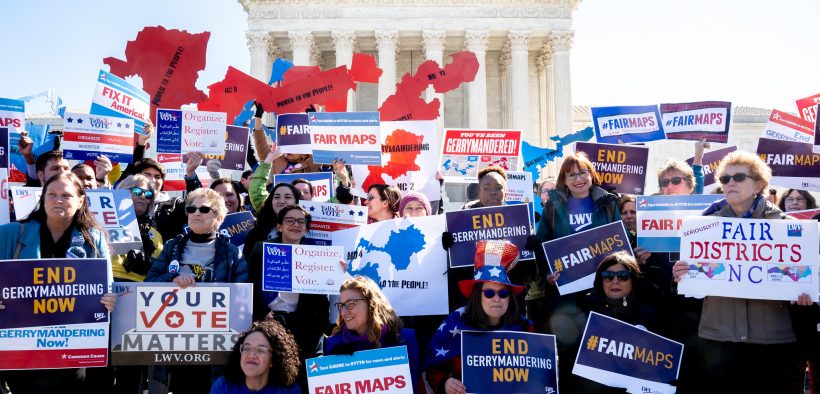Historic Win as Federal Court Rules Against Gerrymandering

“There comes a point and a time in which the courts have to intercede to protect constitutional rights.”
Last Thursday, in a court case about gerrymandering, federal judges in Michigan unanimously struck down 34 of Michigan’s U.S. House and state legislative districts as unconstitutional.
The ruling marks the latest example in a series of federal court decisions challenging the constitutional legitimacy of partisan gerrymandering. A pair of cases from Maryland and North Carolina are currently being judged by the Supreme Court.
“Federal courts must not abdicate their responsibility to protect American voters from this unconstitutional and pernicious practice that undermines our democracy. Federal courts’ failure to protect marginalized voters’ constitutional rights will only increase the citizenry’s growing disenchantment with, and disillusionment in, our democracy, further weaken our democratic institutions, and threaten the credibility of the judicial branch,” the decision reads.
Gerrymandering and ‘Packing’ Districts
Gerrymandering occurs through “packing,” where Democratic or Republican voters are stuffed into a few districts, and “cracking,” where voters are spread out over districts to render them minorities.
The panel cited internal emails from GOP aides strategizing ways to “pack and crack” the electoral map and “cram all of the Dem garbage… into only four districts.”
“The breadth of evidence of discriminatory intent, from these multifarious sources, renders Senate intervenors’ ‘legislative intent’ argument meritless,” Justice Clay wrote.
The Michigan decision requires the state legislature produce new maps by August 1, and could have a significant impact on 2020 elections.
A Conservative Defense of Gerrymandering
Conservative critics of judicial interference in state districting argue it represents an attempt to impose “proportional representation”, an electoral system where legislative seats are distributed based on a state’s percentage share of the vote. The National Review’s James W. Lucas argues this set a dangerous precedent for future litigations:
“The elections clause of Article I of the Constitution explicitly provides that Congress and state legislatures shall determine the “Times, Places and Manner of holding Elections for Senators and Representatives… If a constitutional text as clear and explicit as the elections clause can be thus judicially repealed using the equal-protection clause, what’s to stop a Supreme Court freshly packed with more leftists from using the equal-protection clause against other leftist constitutional bugaboos explicitly set out in the Constitution, such as the Senate or the Electoral College?”
Allison Riggs, chief litigator on behalf of the League of Women Voters, is challenging Lucas’ argument. Riggs’ case, Rucho vs. The League of Women Voters of North Carolina, is part of a pair of partisan-gerrymandering cases heard by the Supreme Court in March. According to Riggs:
“The North Carolina legislature has passed probably 25 or more unconstitutional laws this decade that courts have struck. And the conservatives on the Court want democracy to fix this. They don’t want the courts to fix it. Gorsuch and Kavanaugh kept trying to pound this drum about, “Well, states can fix this themselves. We don’t need to do it.” They want to leave this stuff to the voters, but there comes a point and a time in which the courts have to intercede to protect constitutional rights. If you rig electoral districts so that it doesn’t matter if voters turn out in record numbers, it doesn’t matter if you have a five point democratic swing in North Carolina. You’re still going to have the same electoral outcome.”
Riggs doesn’t believe politics needs to be entirely removed from districting, but that agreed upon boundaries should to be set to prevent egregious cases of partisan-gerrymandering.
Critics of partisan gerrymandering argue it erodes public trust in the democratic process. Consider Rep. David Lewis’ (R-NC) remarks when he led North Carolina’s redistricting initiative in 2016: “I propose that we draw the maps to give a partisan advantage to 10 Republicans and three Democrats because I do not believe it’s possible to draw a map with 11 Republicans and two Democrats.”
That year, NC Republicans won 10 of 13 House seats, even though Democrats won 47 percent of the state vote.
According to a 2018 Axios poll, only 51% of Americans have faith in American democracy, while 37% have lost faith.















